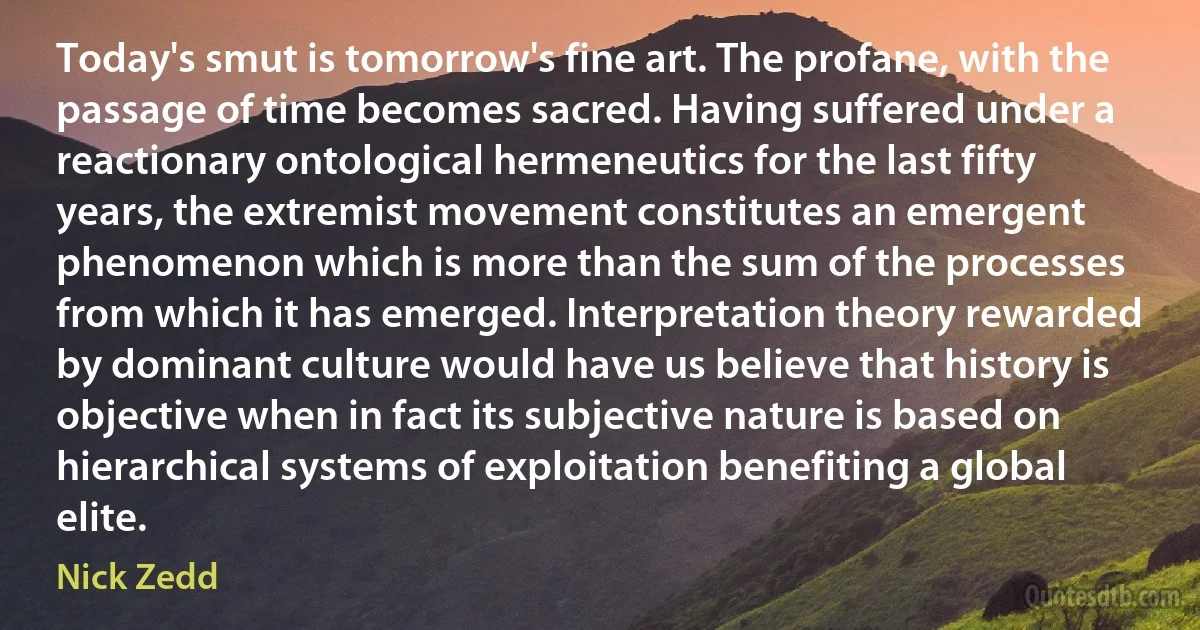Hermeneutics Quotes
Talk can neither be verified nor falsified in any rigorous sense. This is an open secret which hermeneutics and aesthetics, from Aristotle to Croce, have laboured to exorcise or to conceal from themselves and their clients. This ontological, which is to say both primordial and essential axiom (or platitude) of ineradicable undecidability needs, none the less, to be closely argued.

George Steiner
There does seem to be among some members of our profession a rather desperate search for a "fundamental theory of information", which leads them to attempt to derive our practice from disciplines such as epistemology, or hermeneutics, or discourse analysis, or semiotics, or even "cybersemiotics". Their derivations rarely make adequate contact with the realities of information practice ... The theory of a science should spring from deep immersion in its practice.

Brian Campbell Vickery
Recent biblical exegesis by Anthem's newest organization, Hermeneutics Unlimited, had established beyond doubt that Jesus Christ was adamantly opposed to universal health-care insurance, class-action lawsuits, and corporate whistleblowers. Several prominent postrationalist theologians had successfully exposed public education for the misguided Marxist boondoggle it was, while a majority in Congress now advocated replacing the secular school system with private academies committed to sparing children the bad news that Charles Darwin had brought back from the Galápagos Islands.

James K. Morrow
Ideology critique raises a claim that it shares with hermeneutics, namely, the claim to understand an "author” better than he understands himself. What at first sounds arrogant about this claim can be methodologically justified. Others often really do perceive things about me that escape my attention-and conversely. They possess the advantage of distance, which I can profit from only retrospectively through dialogic mirroring. This, of course, would presuppose a functioning dialogue, which is precisely what does not take place in the process of ideology critique.
An ideology critique that does not clearly accept its identity as satire can, however, easily be transformed from an instrument in the search for truth into one of dogmatism. All too often, it interferes with the capacity for dialogue instead of opening up new paths for it.

Peter Sloterdijk
If we can recover the naturalistic ambitions of Marx, Nietzsche, and Freud, ... philosophy becomes relevant because the world-riven as it is with hypocrisy and concealment-desperately needs a hermeneutics of suspicion to unmask it. And by taking these three seminal figures of the Continental traditions as philosophical naturalists we show their work to be continuous with the naturalistic turn that has swept Anglophone philosophy over the past several decades. ... The antipathy to naturalism often thought to be constitutive of "the Continental tradition” is simply an artifact of cutting the joints of that tradition in certain places.

Brian Leiter
Beliefs arrived at the wrong way are suspect: that is the epistemological point exploited by the practitioners of the hermeneutics of suspicion. It is ironic, to be sure, that, in recent years, these practitioners should have fallen prey to moralizing readings, readings that, themselves, cry out for a suspicious interpretation.

Brian Leiter
Western academics not only produce critical editions of dharma texts but determine the very categories of the discourse, the manner in which complex words and situations are contextualized, what is included as interesting and relevant (and what is left out), which social theories and textual hermeneutics are to be used, and who the authorities are in matters of interpretation. Engaging in sweeping generalizations, the Western academy routinely passes judgement on whether Hinduism is a legitimate religion, how and when it should be discussed (if at all), and who its authorized spokespersons are. All of this causes many in the dharmic traditions to doubt the legitimacy of their culture, especially in relation to the established, prevailing taxonomy.

Rajiv Malhotra


